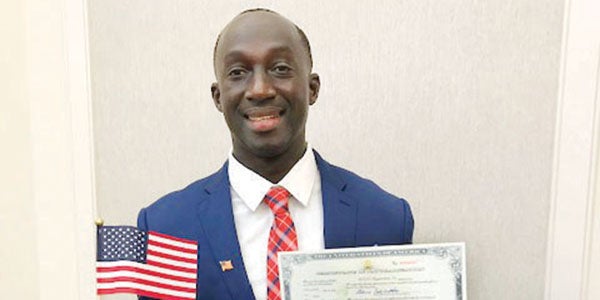Mazimpaka working as social worker in Florida
Published 10:35 am Friday, January 31, 2020

- Etienne “Steve” Mazimpaka became a U.S. citizen in November of 2018. (Submitted photo)
DOWAGIAC — Home for Etienne Mazimpaka has changed over the years.
In a way, Rwanda native has two lives. One of his childhood in Central Africa and second, American life, which began in Dowagiac.
On the exact date of Nov. 7, 1993, Mazimpaka’s American life officially began. His parents sent him to live with his sister and brother-in-law to obtain a quality education. A year later, the Rwandan genocide would begin, with more than 800,000 deaths occurring in 100 days.
Mazimpaka was grateful for the opportunity to continue his education. Still, the distant move was scary and overwhelming for the then-freshman. Eventually, the transition would grow comfortable because the game of soccer was universal.
At age 2, Mazimpaka started playing soccer in Rwanda. He went on to play with a local team in elementary and middle school. At 16, he played a high level of soccer for a premier league in Rwanda.
Despite the familiarity of the sport, the American way had its differences.
“It wasn’t very popular in that time in southern Michigan, especially in Dowagiac,” Mazimpaka, who started going by ”Steve,” said. “That did not stop me from continuing to play.”
In his sophomore year, Mazimpaka began his American soccer career. The team he meshed with had backgrounds from all around the world.
“I was lucky to play with some of the other international students,” he said. “Some of the American soccer players were going to school at the time. We developed a good soccer team, and we competed because it was a diverse team. We had a Hispanic population. We had European international players. We had South American and then American.”
While soccer became Mazimpaka’s focus, track and field quickly caught on. The football field was the last uncharted territory Mazimpaka would discover.
His junior year, a friend on the football team convinced him to practice kicking extra points and field goals one day. The varsity head coach at the time, Bernard Thomas, told Mazimpaka he wanted to see him on Friday night at 7 p.m. in the locker room ready for varsity. Mazimpaka told Bernard he was only a soccer player, and that his sister would kill him if he told her he was going to play football.
After getting permission from his sister, Mazimpaka, who described himself as small in stature, learned to kick from scratch. In 1996, he would set a single-season PAT record, making 58-of-59 kicks.
His senior year brought seriousness in the recruiting prcess for Mazimpaka, who received many letters to pursue both football and track and field at the collegiate level. Still, he only had eyes for soccer.
“My dream was to play soccer professionally. That was my No. 1 dream,” he said.
With recommendations from Larry Crandall and Bruce Laing, who had become Mazimpaka’s friends, he was encouraged to attend Culvers Academies, a college preparatory school. After attending for a year, Mazimpaka went to Siena Heights University and received a scholarship to play soccer. He made his mark on the Halo Huskies program. Mazimpaka holds the seventh-highest career record for his 28 goals in 1998-2001. With school as a top priority, he graduated in four years with a bachelor’s degree in social work.
He went on to become a social worker for Catholic Social Services in Monroe, Michigan. After, he worked for a head start program for three years.
Eventually, Mazimpaka found another new home in Tallahassee, Florida. He currently works as a social worker for the public defender office’s juvenile department.
“I provide services for high-risk youth and teenagers in Leon County, Florida,” he said. “I assist with mental health, substance abuse, therapy and education.”
On Nov. 15, 2018, Mazimpaka’s other dream came true, not in the form of becoming a professional soccer player, but instead becoming a U.S. citizen. On that day, a ceremony was hosted and was attended by family members, friends and coworkers. Also present were Crandall and his wife.
“I’ve been very lucky to be here in the U.S., and to be welcomed here and meet wonderful people in my life,” he said. “Me and Mr. Crandall have been friends for 25 years since high school. He has become a family member. It’s been wonderful and is still going.”
Mazimpaka’s other dream is still living. He continues to be a die-hard soccer fan and player. He plays for a local team and is a soccer referee at the high school, collegiate level and local professional levels.
“I am still in the soccer world very much,” he said. “That’s my life, and that’s my therapy. Soccer is how I release all the work stress and let it get away.”
Sports for Mazimpaka were more than wins or losses. They were a means of survival and assimilation into American culture. His American roots in the community of Dowagiac today remain prevalent.
“I’m still in touch with a lot of people from Dowagiac,” he said. “I lived in Michigan for almost 10 years, so that was where I built my relationships with my Dowagiac family. They have very good people, who I met and made a big difference in my life. They are still in my life. I am so happy when you meet good people, and you keep in touch with them forever and forever.”






